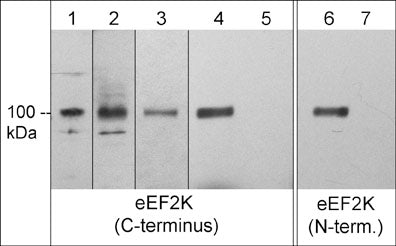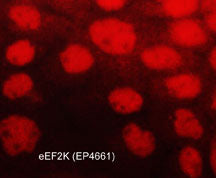Anti-eEF2K (C-terminus) Antibody
- SPECIFICATION
- CITATIONS
- PROTOCOLS
- BACKGROUND

Application
| WB, IHC |
|---|---|
| Primary Accession | O00418 |
| Reactivity | Bovine, Chicken, Drosophila, C.Elegans |
| Host | Rabbit |
| Clonality | Rabbit Polyclonal |
| Isotype | IgG |
| Calculated MW | 82144 Da |
| Gene ID | 29904 |
|---|---|
| Other Names | eEF-2, eEF-2K, CaMK-III, eukaryotic elongation factor |
| Target/Specificity | Eukaryotic elongation factor 2 (eEF2) catalyzes the translocation of peptidyl-tRNA from the A site to the P site on the ribosome. eEF2 kinase (eEF2K) phosphorylates and inactivates eEF2, resulting in the inhibition of peptide-chain elongation. eEF2K is normally dependent on Ca2+ ions and calmodulin, and can be activated by PKA in response to elevated cAMP levels during cell stress- or starvation-related conditions. Regulation of eEF2K occurs through phosphorylation at multiple sites. Ser-78 phosphorylation is required for calmodulin binding and eEF2K activity, while phosphorylation of Ser-500 is required for Ca2+/calmodulin-independent kinase activity. Thr-348 is an autophosphorylation site that is required for kinase activity. Inhibitory phosphorylation may also regulate eEF2K, since phosphorylation at Ser-359 by SAPK4/p38delta causes inactivation of eEF2K. Thus, multisite phospho-regulation of eEF2K may be important for proper control of eEF2K activity and protein translation. |
| Dilution | WB~~1:1000 IHC~~1:100~500 |
| Storage | Maintain refrigerated at 2-8°C for up to 6 months. For long term storage store at -20°C in small aliquots to prevent freeze-thaw cycles. |
| Precautions | Anti-eEF2K (C-terminus) Antibody is for research use only and not for use in diagnostic or therapeutic procedures. |
| Shipping | Blue Ice |

Thousands of laboratories across the world have published research that depended on the performance of antibodies from Abcepta to advance their research. Check out links to articles that cite our products in major peer-reviewed journals, organized by research category.
info@abcepta.com, and receive a free "I Love Antibodies" mug.
Provided below are standard protocols that you may find useful for product applications.
Background
Eukaryotic elongation factor 2 (eEF2) catalyzes the translocation of peptidyl-tRNA from the A site to the P site on the ribosome. eEF2 kinase (eEF2K) phosphorylates and inactivates eEF2, resulting in the inhibition of peptide-chain elongation. eEF2K is normally dependent on Ca2+ ions and calmodulin, and can be activated by PKA in response to elevated cAMP levels during cell stress- or starvation-related conditions. Regulation of eEF2K occurs through phosphorylation at multiple sites. Ser-78 phosphorylation is required for calmodulin binding and eEF2K activity, while phosphorylation of Ser-500 is required for Ca2+/calmodulin-independent kinase activity. Thr-348 is an autophosphorylation site that is required for kinase activity. Inhibitory phosphorylation may also regulate eEF2K, since phosphorylation at Ser-359 by SAPK4/p38delta causes inactivation of eEF2K. Thus, multisite phospho-regulation of eEF2K may be important for proper control of eEF2K activity and protein translation.
If you have used an Abcepta product and would like to share how it has performed, please click on the "Submit Review" button and provide the requested information. Our staff will examine and post your review and contact you if needed.
If you have any additional inquiries please email technical services at tech@abcepta.com.













 Foundational characteristics of cancer include proliferation, angiogenesis, migration, evasion of apoptosis, and cellular immortality. Find key markers for these cellular processes and antibodies to detect them.
Foundational characteristics of cancer include proliferation, angiogenesis, migration, evasion of apoptosis, and cellular immortality. Find key markers for these cellular processes and antibodies to detect them. The SUMOplot™ Analysis Program predicts and scores sumoylation sites in your protein. SUMOylation is a post-translational modification involved in various cellular processes, such as nuclear-cytosolic transport, transcriptional regulation, apoptosis, protein stability, response to stress, and progression through the cell cycle.
The SUMOplot™ Analysis Program predicts and scores sumoylation sites in your protein. SUMOylation is a post-translational modification involved in various cellular processes, such as nuclear-cytosolic transport, transcriptional regulation, apoptosis, protein stability, response to stress, and progression through the cell cycle. The Autophagy Receptor Motif Plotter predicts and scores autophagy receptor binding sites in your protein. Identifying proteins connected to this pathway is critical to understanding the role of autophagy in physiological as well as pathological processes such as development, differentiation, neurodegenerative diseases, stress, infection, and cancer.
The Autophagy Receptor Motif Plotter predicts and scores autophagy receptor binding sites in your protein. Identifying proteins connected to this pathway is critical to understanding the role of autophagy in physiological as well as pathological processes such as development, differentiation, neurodegenerative diseases, stress, infection, and cancer.



